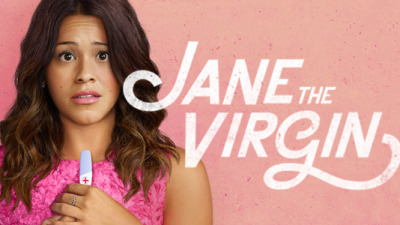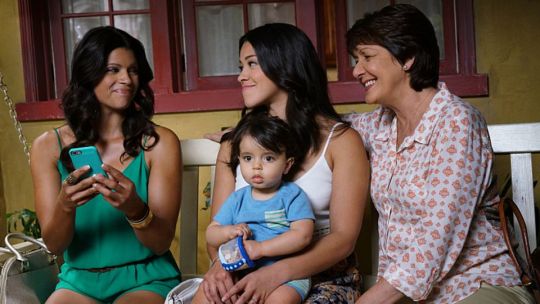
Okay everyone, I’m taking a break from the wonderful
summer routine to write a post about the newest show I’m addicted to: Jane the Virgin. I have to admit, the
name was enough to turn me off for quite some time, and even after I watched
the first episode, it took me a couple of months to return to the show. But I
quickly became hooked.
The show follows Jane, a Latina living in Miami who is
accidentally artificially inseminated with the sperm of her boss, who she
kissed one time five years ago and whose sister—you guessed it—is the doctor
who made the mistake. The show is the contemporary version of the telenovela,
in which plots are complicated, move fast, and sometimes (okay, most of the
time) don’t jive with reality.
But what I love most about the show is that I can’t
pinpoint one thing that makes it good. It’s the combination of many things.
First off, the cast. The three main characters are all women (!!!) and more
than that, the main character, Jane, has a body that looks like, well, it looks
like mine. Which is to say, it’s not the stick thin, blonde and unnaturally
beautiful actresses that we as a society have become accustomed to. And it’s
wonderfully refreshing. It’s not often I see an actress, let alone the
protagonist of a show, have a body that’s not stick thin or grandly overweight,
but rather in the middle and with lots of curves. It’s wonderful to be able to
see a part of myself in Jane.

The next thing I love is the remarkable mix of English
and Spanish that happens on the show. The family is Latina, with roots in
Venezuela, so this mix not only makes sense, but also portrays what many
immigrant families go through on a daily basis. For example, the grandmother
Alba, who is the one who immigrated, almost always speaks in Spanish, and the
other characters respond to her more or less in English.
Alba brings me to my next point. The show makes good use
of its stereotypical ‘Latin lover’ narrator by combining his narration with
hash tags and commentary that viewers have to read. A prime example of this is
when Alba finally decides to apply for a green card, after living many years in
the U.S. being scared of deportation. Her experience exposes the completely backwards
and unnecessarily complicated process immigrants have to go through, and hash
tags saying things like “seriously” and “vote vote vote” appeared on the screen
during the characters’ conversations about the process.
Other difficult, but also essential, topics are
discussed, like abortion and sex before marriage. Anyone who knows me, knows
that I have fierce opinions on both of these subjects, but the show boils it
down to one basic tenet that many people often forget or choose to ignore—it is
the woman’s choice to make decisions about her body. Done. Nothing more needs
to be said. Another topic they tackle is slut shaming—another big, emphatic NO.
Alba realized that she made Xiomara feel the same shame that others made her
feel after she slept with her boyfriend before being married when Xiomara had
sex before marriage, and deeply regretted it.
The female characters in the series are also strong,
independent women who raise children, have careers, and put themselves first.
Jane finds a balance between raising her child and striving to become a writer,
and when Xiomara, Jane’s mother, and Rogelio, Jane’s father, get back to
together, Xiomara is determined that she wants no more children, because she
wants to focus on herself for the next 20 years instead of raising another
child, like Rogelio wanted. And going back to Jane, it’s also refreshing to see
a character that isn’t only focused on her love life, but is also smart and
wants a career. I have to admit, it’s also her choice of career that I admire
wholeheartedly—she wants to a writer, like I said, and also loves to read. So
for me, the references to books—The House
of the Spirits, One Hundred Years of
Solitude—and even to magical realism (go Google it!!) are amazing. Looooove
it.
Through all of these reasons, what I’m really trying to
say is that shows like Jane the Virgin
matter. They matter because it’s important to raise up Latino actors, just like
it’s important to raise up black actors, Asian actors and all minorities, in
order to break the status quo. Because when that happens, we are all stronger
for it. They matter because they talk about important issues that are sometimes
hard to talk about, but which are absolutely necessary to talk about. They matter because they are making society
better, for everyone.
So happy viewing.